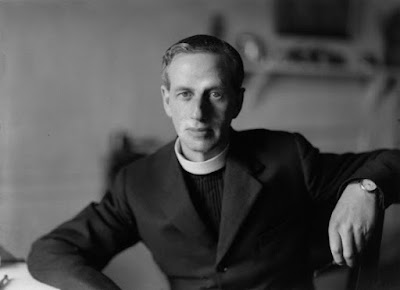Ronald Knox was an Anglican priest and scholar who converted to Catholicism in 1917. In later years, he translated the Bible into English-- directly from St. Jerome's Vulgate. He was a friend of G.K. Chesterton, and indeed preached Chesterton's funeral homily.
His account of his conversion, A Spiritual Aeneid, is a book I've just finished reading for the third time. I was struck by his account of how important the role of the Papacy was in his thinking, as he moved towards Catholicism. I think it's worth sharing today, when it has become common among conservatives (as it was common among liberals until very recently) to whittle the Pope's role down to a bare minimum. Italics are Knox's own.
"Strange as it may seem, I had always assumed at the back of my mind that when my handbooks talked about "Arian" and "Catholic" bishops they knew what they were talking about; it never occurred to me that Arians also regarded themselves as Catholics and wanted to know why they should be thought otherwise. "Ah! but", says my Church historian, "the Church came to think otherwise, and thus they found themselves de-Catholicized in the long run. But what Church? Why did those who anathemized Nestorious come to be regarded as "Catholics" rather than those who still accept his doctrines? I had used this argument against the Greek Orthodox Church when it broke away from unity, but it had never occurred to me before that what we mean when we talk of the Catholic party is the party in which the bishop from Rome was, and nothing else; that the handbooks had simply taken over the word without thinking or arguing about it, as it explained itself; but it didn't."If you ask "Who are the Orthodox?" you will be told "The people who hold the Orthodox Faith". If you ask them how they know it is the Orthodox Faith they say: "Because it is held by the Orthodox Church". And the Nestorians will say exactly the same of themselves-- and who is to choose between them? Each say they have the consensus fidelium behind them, and if you ask who the fideles were you are referred back to the very formula which the consensus fidelium was to prove. But if you ask a Catholic: "What is the Catholic Faith?", and are told it is held by the Catholic Church: if you persevere, and ask what is the Catholic Church, you are no longer met with the irritatingly circular definition; you are told it is the Church that is in communion with the bishop of Rome.
(...)
"If you took a Gallican view of the Church, and wanted the Papacy to be a constitutional monarchy, your church became a philosopher's dream instead of a living reality; in ordinary real life, you must have the Pope as he is, or no Pope at all."

No comments:
Post a Comment